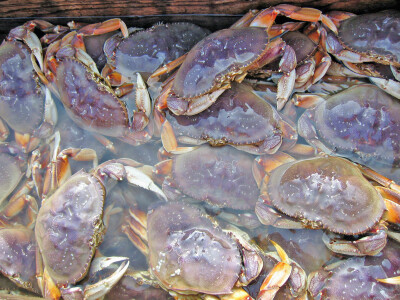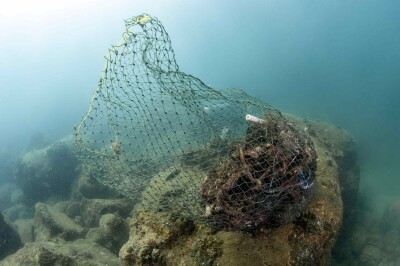Show us your face!
Those of you who were regular readers of Alaska Fisherman's Journal will recall that each year the January issue featured crew shots.
We think celebrating the men and women who work the decks of America's fishing vessels is a great tradition, and we are excited about keeping it alive in the pages of National Fisherman.
If you have a digital picture of your crew at work, at play or even at rest, please email it to me with the subject line "crew shots" at [email protected]. High-resolution images — i.e., those that are several inches wide — are best.
Alternatively, you can send film or slides to me at 121 Free St., Portland, ME 04101. Please write "crew shots" on the envelope. We'll scan them and return them to you.
You say you don't have such a photo? Well, take one, wherever you are, and as (AFJ editor) John Van Amerongen used to say, "Show us your face!"
Deadline is Oct. 31, and remember to include IDs and any other caption information you feel is important.
* * *
While we're on the subject of hearing from readers, we find ourselves scratching our heads every month when it's time to assemble the Mail Buoy. Why? Because we're wondering how we're ever going to fill the space with the handful of letters we generally get.
I know you're busy, but believe me: We could do a better job if you'd let us know what's on your mind. More important, it's crucial that fishermen go on the record about what's important to them.
Email is fine, just make sure you put "Mail Buoy" in the subject line and email it to [email protected]. Please include your hometown or home port. We also read snail mail, which can be sent to me at 121 Free St., Portland, ME 04101. Please put "Mail Buoy" on the envelope somewhere.
* * *
Enough housekeeping.
I was gratified to read recently a Wall Street Journal story about the effects milder weather is having on Greenland. "Farmers, ranchers and fishermen," the sub-headline reads, "are welcoming milder weather predicted to cause 'catastrophe.'"
Setting aside the question of global warming, which with many people is more a matter of religion — they take it on faith that a catastrophic warming trend is under way — than of science, there is little question that Greenland is a more temperate place than it has been. One effect: cod are booming.
Forty years ago, cod were abundant off Greenland and accounted for 90 percent of all fish landed. In the 1980s, however, the seawater cooled and the codfish bailed.
Now they're back — in spades. Kim Hoegdan, a commercial fisherman there, told the Journal, "We've never seen them before in this amount."
Two years ago, when the cod started to return, Hoegdan caught 3,000 pounds. This year, he expects to catch 440,000 pounds.
All of this may not be good news for Greenland's shrimp, which in addition to preferring colder water are forage for cod. That's the way it goes in the dynamic environment of the ocean. We obsess about abundance, but what the ocean seeks is equilibrium.
Consider the surging population of seals. The (Halifax, Nova Scotia) Chronicle Herald reported in mid-August that an abundance of gray seals off Nova Scotia is driving fishermen nuts: Not only do seals feed on swimming fish (more than 40 pounds a day, per seal), but adding insult to injury, they'll nibble on fish when they're meshed or on the hook, leaving behind an eviscerated halibut, monkfish or what-have-you carcass to drop onto the deck.
According to the Gray Seal Research and Development Society, the herd of perhaps 350,000 ought to be reduced by at least 50 percent.
Somehow I don't see that happening. Instead, the seals will eventually eat themselves out of house and home, or the ocean will cool or warm, and they'll move on. The fish will return, or maybe they'll go some other place, depending on what else is happening. The fisherman will wait out the seasons, as he always has, catch what he can, and take the blame for everything.
We try to manage fish as though there'll be some point at which, having gotten everything right, we can take a snapshot and call it good. This fantasy has manifested itself in myriad fishery management follies, among them the notion that fishing mortality is the single most powerful force in the universe and, of course, the 10-year-rebuilding mandate.
As Hoegdan might point out, you can't rebuild a fish stock in 10 years if it takes 20 years for the water temperature to return to the point where they'll come anywhere near you.
We have such a long way to go. If only we were headed in the right direction.
* * *
The primary reason the United States is so far off course is the National Marine Fisheries Service, which steadfastly refuses to offer anything resembling the kind of leadership that would bring us sustainable fisheries.
Rather than take the position that there is a genuine benefit to having thriving coastal communities supplying fish to a hungry nation, NMFS is on a crusade to eliminate boats and reduce infrastructure.
NMFS pays great lip service to the idea of science-based management, but what it really wants is to avoid confrontations with well-funded conservation groups in court. Hence its devotion to individual fishing quotas: If there are few enough operators in a fishery, they'll all make a profit even if the total allowable catch is lower than the data justify.
Unfortunately, low production pushes prices up for consumers and profit margins down for fishermen, processors and distributors, who require volume.
NMFS' solution to this is offshore aquaculture, which it contends will provide jobs for displaced commercial fishermen, presumably dipping fish out of pens, handling dock lines and driving square-ended boats.
On the other hand, if NMFS does for aquaculture what it's done for fisheries, the cod's return won't be a moment too soon.
Unfortunately, it could be Greenlanders who catch them all, because there might not be any of you left.
* * *
It doesn't have to be that way.
I'm convinced that the fledgling organization calling itself the Commercial Fishermen of America represents the independent operator's best shot at developing a political voice that can be heard beyond the dock.
If you didn't read the group's "Dock Talk" article last month, or even if you have, you should visit the CFA Web site, www.cfafish.org.
The organizers represent our coasts from Maine to Alaska to Hawaii, and they've been working hard enough and long enough that any rosy notions they might have had about singing "Kumbaya" around the campfire have long since gone to leeward.
But they've stuck with it. They understand that fishermen need unity, visibility and legislation. They understand fishermen need health insurance. In short, they understand that fishermen need a professional association.
And as someone who has watched them hammer away at this for going on two years, in far-flung meeting rooms from coast to coast, I am confident they can deliver.
It won't be easy. You'll need to check some pet issues at the door. You'll have to believe that politics is the art of the possible, and that the savviest operators are those who play well with others and who understand that to get something, you have to give something.
I've met these folks, however, and I can tell you that if you throw in with them, you'll probably get more from the CFA than the CFA will get from you. And that's the way they want it.
The clock is ticking. In Portland, Maine, there's no longer a place to buy a trawl shackle. The fluke situation in the Mid-Atlantic is a farce. Grouper fishermen don't know what's next, Southerners are still picking up after Katrina, and Californians have watched the federal government cede fisheries management to the Nature Conservancy even as the state rolled out a boatload of new marine protected areas.
Maybe you can make it on your own. But I'd hed
ge my bet with the CFA.
— Jerry Fraser






